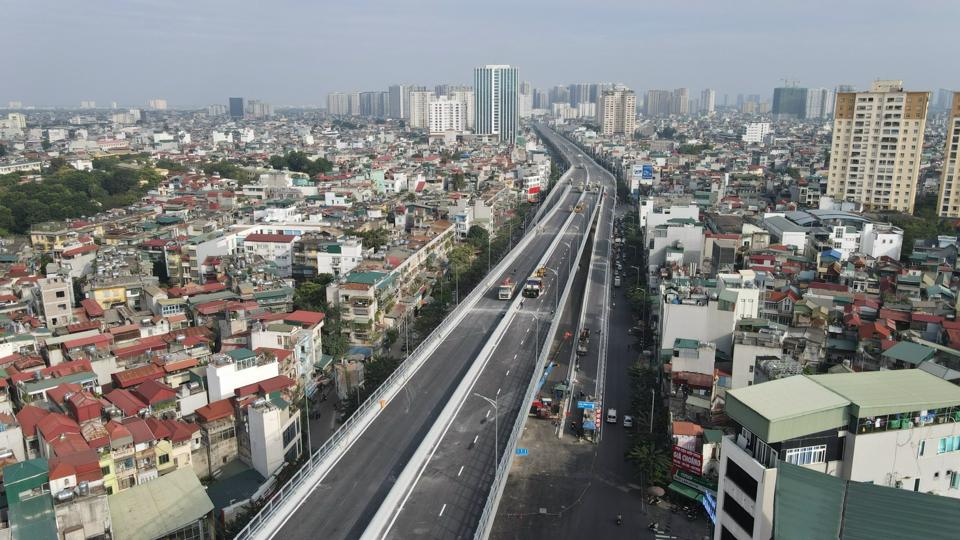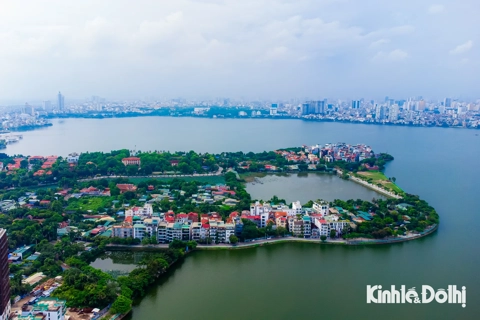Effective public investment as a top political mission: PM
The National Assembly approved the 2023 budget of VND712 trillion ($30 billion), a significant increase from more than VND130 trillion ($5.5 billion) in 2022.
The effective performance of public investment should be considered as a top political task for all levels and sectors in order to ensure a strong push for the socio-economic recovery of the country.
| The construction of Ring road No.2 section Vinh Tuy - Nga Tu Vong in Hanoi. Photo: Pham Hung |
Prime Minister Pham Minh Chinh stressed the view in Directive No. 08 on missions and tasks to promote public investment and economic development in 2023.
This year, the Government set a target to disburse at least 95% of the public funds allocated for this year, which is more than VND676 trillion (US$28.47 billion).
For the current year, the National Assembly has approved a budget of nearly VND712 trillion (US$30 billion), a significant increase of more than VND130 trillion (US$5.5 billion) over 2022 and VND250 trillion (US$10.5 billion) over 2021.
To ensure the successful allocation of public investment capital, Chinh urged Government agencies and localities to implement several measures such as monitoring and assessing the situation, improving forecasting capabilities, and devising appropriate policy responses.
It is essential to focus on enhancing the quality of investment and project preparation while proactively and flexibly addressing any difficulties and obstacles related to institutional mechanisms and policies, Chinh noted.
The Government leader also stressed the importance of strengthening administrative discipline and promoting decentralization and responsibility among each agency.
"Coordination among ministries, central agencies, localities, and units must be strengthened to ensure efficiency in carrying out tasks without creating bottlenecks or wasting resources," Chinh said.
It is also essential to promote innovation and digital transformation, and reform administrative procedures in all aspects of public investment activities, he said.
Among the key tasks, the Ministry of Finance will review and amend legal regulations related to public investment, coordinate with relevant agencies to address difficulties related to ODA and concessional loans and monitor market price movements to propose policies that contribute to price stability and cost reduction for enterprises.
The Ministry of Natural Resources and Environment is responsible for guiding and resolving difficulties in the mining licensing process and ensuring the efficient exploitation of stone, sand, soil and gravel for public investment projects. It will also speed up the assessment of mineral resources for marine sand exploitation to meet the demand for infrastructure projects in the Mekong Delta.
The Ministry of Construction will monitor the construction materials market and propose solutions to ensure supply and demand and control prices. It will also prepare a detailed disbursement plan for each project, strengthen site inspections and supervision, and assign specific leaders to monitor progress and ensure efficient disbursement.
Greater emphasis should be placed on enforcing discipline and regulations for the disbursement of public investment capital, with a focus on speeding up site clearance, construction progress, and resolving land and natural resource-related obstacles. Legal action must be taken against investors, project management committees, organizations and individuals who deliberately cause difficulties or delays in capital allocation, implementation and disbursement.
There is a need to replace weak, stagnant, and disruptive civil servants and officials in public investment management. Recognizing investment preparation as a critical task and a prerequisite for determining project feasibility and effectiveness is essential. Establishing a clear and specific mechanism of allocation and coordination in terms of authority and responsibility among agencies and units for carrying out project investment procedures is of paramount importance.












